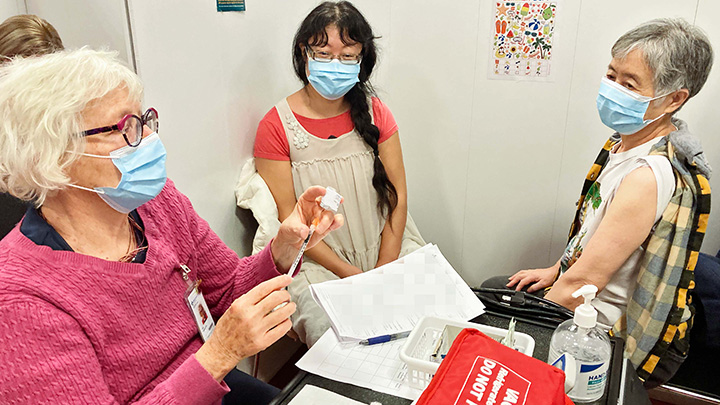
By Dr. Cora Constantinescu, pediatric infectious disease specialist with AHS
Vaccines are the most powerful tool for protection against COVID-19, but too many Albertans are still leaving this important tool on the shelf, especially when it comes to booster shots.
Over 87 per cent of adults and 85 per cent of adolescents have completed their two-dose series.
It’s heartening that a large majority of Albertans, including so many teens, have stepped up to protect themselves and others with the two shots, but there are many still who remain unvaccinated.
And the picture gets worse when it comes to third doses, as fewer Albertans have taken this important step for their health. Teens just recently became eligible for the booster but adults in Alberta have been eligible for a booster for over four months, yet less than half of those 18 and over have received a third dose.
This is a missed opportunity to dramatically reduce risk of hospitalization and severe disease, especially against Omicron. This variant is more transmissible than the original strain of COVID and other variants. For many, two shots alone may not be sufficient protection. There is increasing evidence that immunity after vaccination eventually wanes. A third dose significantly increases protection against hospitalization and death related to Omicron.
With COVID case counts and hospitalization numbers declining, some might feel they don’t need to worry anymore about vaccination.
But COVID-19 is still in our communities and will be for a while, with hundreds of people currently in hospital with COVID-19 and Omicron’s BA.2 subvariant the dominant strain in Alberta. Being immunized with all of the doses that are you eligible for continues to be the best way to protect yourself against COVID-19.
Some Albertans may also feel that because they are healthy they don’t need a booster. While some people are at higher risk of severe outcomes from COVID-19, we have seen time and time again that we cannot always predict who will end up in hospitals and who will get seriously ill from virus.
As well, people sometimes underestimate their own need for protection, or aren’t aware of the factors affecting their own health. Even if a person is at low risk of serious consequences from COVID-19, getting a third dose helps protect others, especially those who may be more vulnerable.
It’s possible that some people may be avoiding getting their third dose because of lingering concerns over the safety of COVID-19 vaccines. We now have even more reassuring safety data on booster doses: the number of adverse events associated with the vaccines are low and the frequency of adverse events following booster doses are comparable to those reported after other doses. Severe but rare adverse events such as myocarditis are actually reported less frequently with boosters than with the second vaccine doses.
Vaccination of children is another area where more can be done in the battle against COVID-19.
For children aged five to 11, just over a quarter have two doses of the pediatric Pfizer vaccine. Yet the same reasons adults should get vaccinated apply to children.
Working at Alberta Children’s Hospital, I continue to see healthy children whose COVID-19 infection puts them in Emergency Departments, in hospital wards, and in ICUs.
Multisystem Inflammatory Syndrome, associated with COVID, is a rare but serious condition that has very high ICU admission rates.
No parent wants to see their child in hospital fighting off this virus. We want our kids in schools, in activities, free of the mental and physical burdens of this pandemic.
For both adults and kids, vaccines offer the best protection from getting or spreading COVID-19.
They dramatically reduce the risk of severe outcomes, and help prevent you from getting infected with COVID-19.
It is not too late: we can all strive for better and more enduring protection as we continue fighting back this virus.
Add your comment